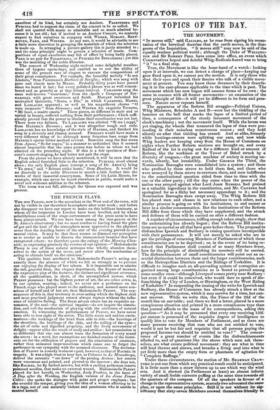THE FRENCH PLAYS.
THE star PLESSY, now in the ascendant at the West end of the town, will not be visible in our theatrical hemisphere after next week ; and before she disappear we have our report to make on this brilliant luminary, at 'whom all the lorgnettes in London have been levelled, and by whose scintillations some of the stage-astronomers of the press seem to have been planet-struck. We too have been among the star-gazers at the St. James's observatory ; but we must confess to having found the glare of gas and the heat of the atmosphere more oppressive to the physical sense than the dazzling lustre of the star of the evening proved to our mental vision. It may be that these causes so dimmed our perception as to render us unable to discern the transcendent beauties that have enraptured others we therefore quote the eulogy of the Morning Chro- side, as expressing precisely the reverse of our opinion—" Mademoiselle Plessy is one of those natural actresses who wholly abandon them- selves to the action of the scene, and never allow the mechanism of acting to obtrude itself on the attention." The qualities here attributed to Mademoiselle PLESSY'S acting are exactly those the absence of which we felt so strongly as to prevent our enjoying the display of her talents. It is impossible not to admire the tall, graceful form the elegant deportment, the finesse of manner, the expressive play form, features, the distinct and significant utterance, all the qualifications, in short, of the accomplished actress, which PLESSY possesses : but the highest power of art, the ars celare erten:, is, in our opinion, wanting ; indeed, we never saw a performer on the French stage who played more to the audience, and seemed more con- scious of herself and of her art, than Mademoiselle PLEBSY. The con- sequence of this is, that tendency to over-acting which the highest skill and most practised judgment cannot always repress without the influ- ence of intuitive feeling. The finest art can create but an exquisite au- tomaton, if the soul—the spiritual impulse—do not inspire the simula- tion, and veil the mechanism of playing with the attributes of natural emotion. In witnessing the performances of PLESSY, we have never been able to lose sight of the artiste. The little starts and sudden excla- mations—the rockings of the head from side to side—the heavings of the shoulders, the bridlings of the chin, and the rolling of the eyes— the air of calm and dignified propriety, and the lively movements of delight—appear alike the result of study and artifice : her enunciation is so deliberate that one can almost trace the formation of every sound she utters : in a word, her assumptions are finished studies of the histri- onic art for the edification of players and the admiration of amateurs, rather than animated impersonations which cause one to forget the performer in our sympathy with the assumed character. The declama- tion of PLEBBY in comedy is almost equal, however, to that of RACHEL in tragedy. It was a high treat to hear her, as Celemine in Le Misanthrope, deliver the sarcastic "set down" of the prosing Arsinoe : her retorts were venomous and pointed, and pierced to the marrow : she does not, like RACHEL, let fly barbed arrows, but with a smiling politeness inserts poisoned needles, that make no external wound. Mademoiselle PLESSY played for her benefit, on Wednesday, Lady Freelove, in the farce of A Day after the Wedding, the English version of La Jeune Femme Cohere: she spoke the dialogue with point and proper emphasis ; but she overdid the temper, giving you the idea of a woman affecting to be ill a rage, not of one naturally violent and passionate who is unable to 4Vontrol herself.


























 Previous page
Previous page